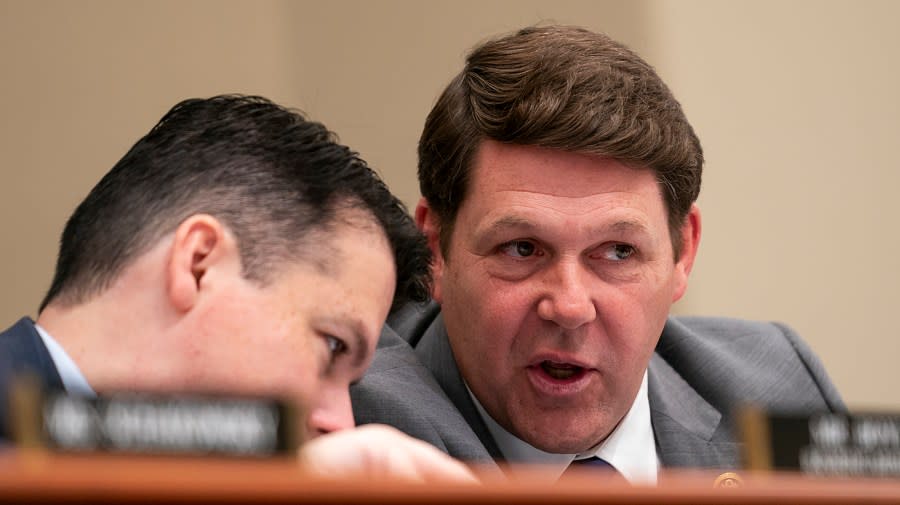House budget leaders look ahead to 2025

- Oops!Something went wrong.Please try again later.
As the critical elections in November quickly approach, some in Congress are already sizing up a jam-packed schedule for 2025, with potentially nasty showdowns over taxes and the national debt on the horizon.
While Congress still has a little more than three months until its next government shutdown deadline, members on both sides have already acknowledged a stopgap of some sort will likely be needed to buy time for spending talks.
Conservatives are pushing to delay a deal on the full-year spending until after the presidential election, believing that if former President Trump is reelected, they’ll have more leverage.
In a pair of interviews that aired Monday, Reps. Jodey Arrington (R-Texas) and Brendan Boyle (D-Pa.), chair and ranking member of the House Budget Committee, respectively, sat down with The Hill’s Bob Cusack to discuss the look ahead.
“I think we keep the majority. I think the Senate is the bigger guarantee — if there is one in politics — that they will flip,” Arrington said in the interview, which was conducted in a partnership with the 92nd Street Y in New York City. “And then I think, Trump’s got the momentum, but it’s going to be a close race.”
Arrington said there has been “a lot of talk about what the trifecta of unified Republican leadership” and that it’s “appropriate” to discuss what a GOP agenda would be. He said he thinks there’s a good chance total GOP control of Congress and the White House could be “the outcome after November.”
The big fight will be over Trump’s signature tax law, which is set to expire at the end of 2025.
Democrats have attacked some of the provisions in Trump’s 2017 Tax Cuts and Jobs Act as giving tax cuts to the wealthy, while also seizing on projections of the legislation’s impact on the nation’s deficits.
Republicans, on the other hand, have pushed for the extension of the former president’s tax law, which they’ve described as “pro-growth,” while also raising scrutiny around the accuracy of its estimated costs to the deficit.
In the recent interview, Arrington expressed confidence in Trump’s tax cuts “by and large” being extended, and that some tax cuts and reforms could broaden the economy and thus bring in more revenue of the government. At the same time, he said Republicans have to acknowledge tax cuts must be paid for to help the budget.
“We need to recognize the positive feedback or what they call dynamic scoring,” he said. “But that’s not to suggest that they pay for themselves entirely, and we cannot — as Republicans who claim to have the mantle of fiscal responsibility — have any agenda that produces greater deficits in the out years, and that we need to be committed altogether to reducing deficits and doing it the right way.”
Boyle called the coming year a “once-in-a-decade opportunity to impact tax and fiscal policy.”
“In order to prepare for that, some of what we’re focusing on now on the Democratic side is doing the preparation work. So we’re ready to hit the ground running in January 2025,” Boyle said, adding he’s already been holding meetings with some of his Democratic colleagues to help get them up to speed ahead of next year.
“I’ve been convening a number of meetings and sort of informational educational roundtables for my Democratic colleagues on the committee to talk about all that will be expiring as set by law,” he said. “Come 2025, it really will be, again, a once-in-a-decade opportunity. So, the work for that doesn’t begin in 2025. It actually, a bit of it begins right now.”
“What is it about the U.S. economy that has made it by far and No. 1 in the world? And that gap between us and everyone else is actually accelerating it,” he said. “So, I think it’s important to understand what brought that about. It didn’t happen by accident, and what lessons can we learn that then can be applied for the conversations that are happening about 2025 and the rest of the next decade?”
As the nation’s $34 trillion-plus debt continues to climb, both budget leaders expressed an urgency about doing something to lower the nation’s rising red ink.
“If we do nothing — whether it’s on the programmatic reform side or the pay-for side — on Social Security and Medicare, two of the most important safety net programs for our seniors, they will be cut automatically,” Arrington said, before pointing to his pitch for a bipartisan commission to explore ways to tackle the national debt.
Pressed on whether he’s spoken to GOP leadership about scheduling a vote on legislation to form such a commission later this year, Arrington said Speaker Mike Johnson (R-La.) is “philosophically all for this.”
“He understands as well as anybody that this sort of bipartisan construct is what will have to happen eventually to take on the big issues,” he said.
In his interview, Boyle also noted that, when it comes to Social Security and Medicare, both will “insolvent in about a decade” if “nothing else happens.”
“So, I recognize that we do have real challenges,” he said. “Not today, not tomorrow, but in the relatively near future that we need to deal with.”
He said he thinks in the end it will be “members who are going to have to solve those problems — not an independent commission.”
Copyright 2024 Nexstar Media, Inc. All rights reserved. This material may not be published, broadcast, rewritten, or redistributed.
For the latest news, weather, sports, and streaming video, head to The Hill.

